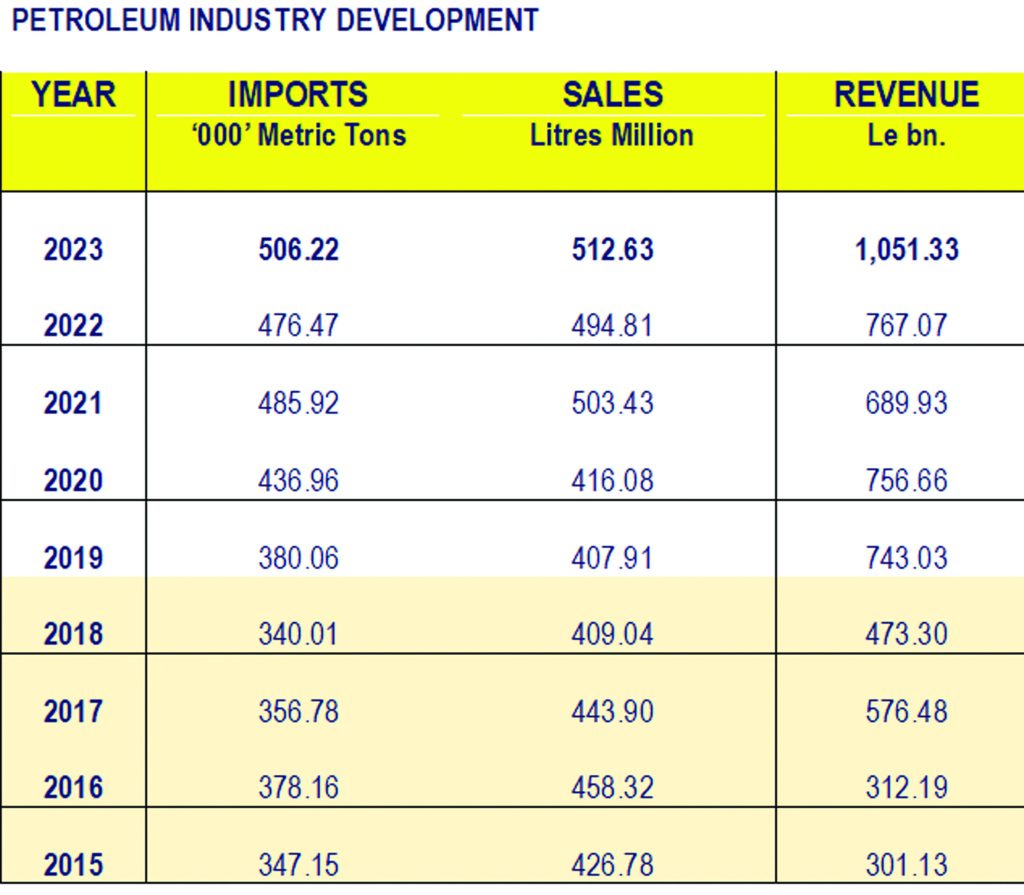Mandate:
The Petroleum Regulatory Agency (PRA) is a statutory body established by Act of parliament (2014) with the core function to grant license and regulate the importation, refining, storage, transportation and distribution of petroleum products so as to ensure their regular supply to users at reasonable standard prices. It is also mandated to ensure efficient administration and enforcement of the enactments relating to downstream petroleum activities.
The petroleum sector is one of the single largest industries in Sierra Leone that consistently contributes in excess 10% of domestic revenue. Sierra Leone currently consumes approximately 1.3 million litres of petroleum product per day (petrol and diesel constituting about 90%), this is projected to increase to 1.8 million litres by 2026.
Leveraging on the strategic leadership of His Excellency President Dr. Julius Maada Bio, the agency has internally adopted three policy objectives:
Firstly, to take leadership in opening up the market space, restore fairness in the industry for all operators that will increase sector efficiency and transparency.
Secondly, focusing on initiatives that will develop the petroleum industry infrastructure particularly storage, additional terminals and maintaining government strategic stock.
Thirdly, to ensure compliance with the petroleum laws and tax commitments in all regulated activities for the greater benefit of all Sierra Leoneans.
These activities include the management of a strategic petroleum stocks programme. Importantly, in December 2022, the government of Sierra Leone approved petroleum purchase and sales agreement to be implemented by the Agency and supervised by the Ministry of Finance and the Ministry of Trade and Industry, coordinated by the Chief Minister.
Since the Sierra Leonean government under the visionary leadership of President Bio runs an open market policy in the sector, investors are assured of fair regulations and best practice to enable citizens enjoy efficient service delivery and value for money. It is instructive that there is currently only one supplier of aviation fuel in the sector. The PRA believes that the sector could do with an alternative supplier of this critical product in the economy. The vision of the Agency is to leverage on the Government’s attractive open market policy to make the sector a compelling place to invest within the region transforming Sierra Leone into a petroleum storage hub.
Improvement and implementation of 2024 Regulatory Act: With the astute leadership of its dynamic Executive Chairman, Mr Brima M Baluwa Koroma, the Petroleum Regulatory Agency has repositioned the Petroleum Downstream Sector for a sustainable National Development aspiration through the introduction of commercial best practices in the petroleum downstream industry with the following objectives:
i) Enforcement mandate to protect the public interest;
ii) Ensure the continuous supply of petroleum products;
iii) Discourage the emergence of a local cartel, monopolies and unfair competition;
iv) Achieve efficiency and cost reduction through mandatory minimum stock balances by licensed petroleum operators;
v) Eliminate barriers for new entrants into the Sierra Leone market.
vi) Discourage the emergence of a local cartel, monopolies and unfair competition;
Exogenous shocks and uncertainties
Developments in global oil markets indicate that the current crises in the Middle East and Europe have caused sustained surge in prices. In the face of these shocks and global uncertainties, the government has chosen a policy option to enter into a reliable petroleum trade arrangement with the key objective of mitigating external shocks and supply chain disruptions.
Diversification and growth: Sierra Leone is open for various business opportunities within the petroleum downstream sector which is one of the largest and transforming industries that touch on peoples’ everyday lives with services ranging from transportation, bulk distribution, storage, refinery, bunkering, lubricants and a host of petrochemical products. Official data indicate that a total of 513 million litres of petroleum products was consumed in 2023.
Adhering to the progressive industry policy, the industry benefited from the construction of a modern tank farm at the dilapidated Kissy Old Refinery into a 55,000 metric tons storage capacity state-of-the-art tank farm. The storage firm, APP, successfully refurbished 14 existing storage tanks to international standards. The two new entrants have immediately registered with Conex Energy completing two large storage tanks with a combined storage capacity of 30,000 metric tons. This is followed by Aminata & Sons with 18,000 metric tons refurbishment of three tanks.The strategic objective is to achieve the national storage capacity of 500,000 metric tons, and improve replenishment period that is currently averages 2-3 weeks.
Industry guidelines: The petroleum regulatory landscape has evolved over the past few years under the New Direction government of President Bio. As part of the petroleum industry reforms, the PRA has introduced guidelines for the major downstream activities including: the construction of gas station, importation of petroleum products, trader’s license; Bulk Road Vehicles (BRVs); trans-shipment and bulk storage.
Pricing: The Agency continues to ensure an efficient, transparent and regular petroleum pricing review. With the acquisition of Platts in 2020 (International oil reference prices), the Agency is now capacitated to determine petroleum prices on daily basis real-time and hence predict fairly pump prices far ahead of time. Similarly, as part of ongoing reforms, the Agency, the Ministry of Trade and Industry, the Ministry of Finance and the World Bank are currently reviewing the obsolete pricing parameters with a revised trigger mechanism that will conform to the current prevailing market conditions that will mitigate the impact of international oil price votalities.

a. Management of Exogenous shocks and uncertainties: In the face of exogenous shocks and global uncertainties in the global oil market, Sierra Leone adopted home grown solutions to mitigate supply disruptions. Between 2020 and 2023, the government of Sierra Leone subsidized the price of petroleum products amounting to USD61.5 million in order to have regular fuel supply. Additionally, the government provided foreign exchange support in excess of USD120 million to facilitate trade in the sector.
b. Strategic petroleum stock: To ensure that Sierra Leone would not be caught napping with low stocks at times of externalities, the tank farm at Kissy Old Refinery constructed by APP has been designed to manage 10,000metric tons storage capacity as strategic stock. The objective of this is to ensure fuel security in Sierra Leone by preparing the government against oil supply disruption; increasing fuel storage capacity for diesel, petrol and fuel oil; serving as supply-source of last resort for Oil Marketing Companies and taking advantage of international oil price volatility in hard times.
c. Alternative Petroleum jetty: The construction of the second petroleum jetty is consistent with Cluster 3 of the Sierra Leone’s Medium-Term National Development Goal regarding infrastructure and economic competitiveness. The jetty is approximately 300m from the tank farm. The emergence of this second jetty is expected to minimize congestion and hopefully, reduce jetty charges on petroleum imports.
d. Price stabilization and sector protection: Despite global oil price volatility since 2020, pump prices in Sierra Leone have almost always been below market price through government subsidies to ease the burden of high fuel prices on the people. This has stabilized the industry and reduced socio-economic strife in general.
The long-term government priority is to achieve industry sustainability, market attractiveness and fiscal stability.


